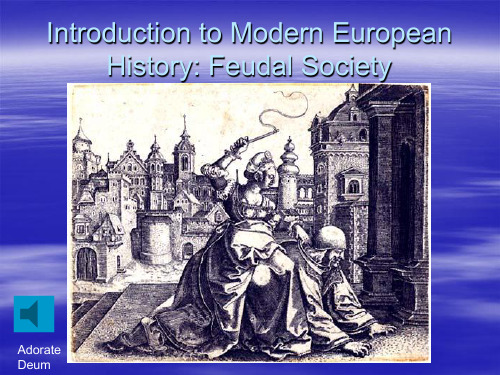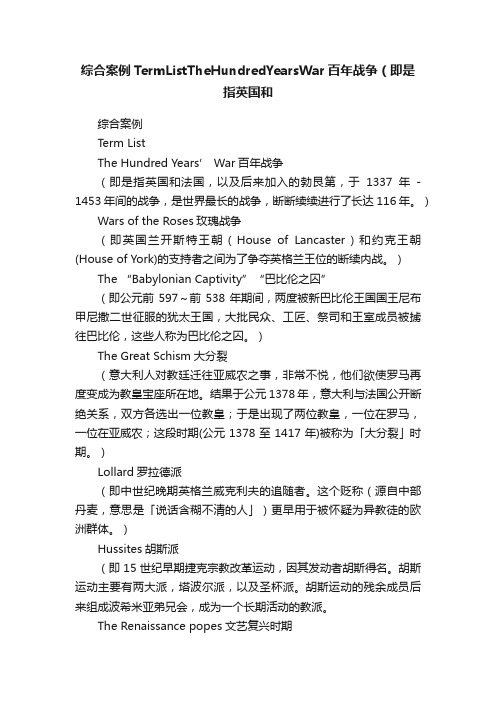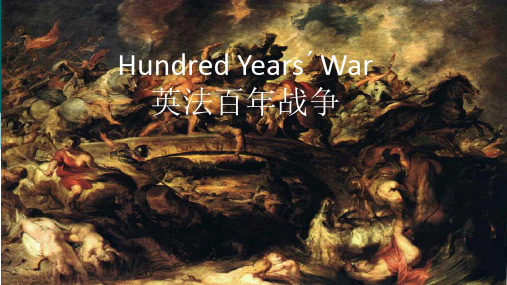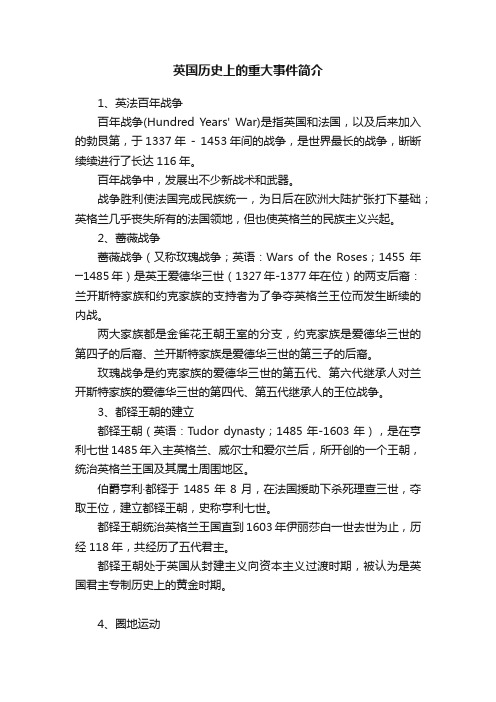英国百年战争英文介绍
英法百年战争

战争的第一阶段
• (1) 1337—1360年。1346年春双方会战于克勒西。法 国投入的兵力是英军的三倍,却被英国的新型步兵打败了。 法军损失11个亲王、1200名骑兵和10000名士兵。英军有 弓箭手9000人,主要是招募来的自耕农。克勒西战役是 一次以少胜多的著名战役,它实际上结束了封建骑士在军 事上的重要作用。1356年,黑太子爱德华指挥的6000名 英军,与法王约翰二世(1350—1364年)指挥的20500 名法军在普瓦提埃发生激战。结果,法军大败,伤亡 4500人,国王约翰和许多法国贵簇被俘,英军损失很小。 1360年,法国被迫签订布勒丁尼和约:爱德华三世放弃 对法国王位的要求,交换条件是加莱和阿奎丹等地重归英 国。法国以50万镑巨款赎回国王,这个数目相当于英王5 年的收入。
英法百年战争
Hundred Years' War (1337年-1453年)
百年战争概况
• 百年战争(Hundred Years' War)是指英 国和法国,于1337年 - 1453年间的战争, 是世界最长的战争,断断续续进行了长达 116年。 • 日期: 1337年-1453年 • 地点: 法国和低地国家 • 结果: 法国胜利 • 领土变更: 法国夺回被英格兰控制的领 地
贞德(Jeanned'Arc、JeannelaPucelle、JoanofArc)(1412年1月6日~1431年5月30日), 被称为“奥尔良的少女”和“圣女贞德”,法国民族英雄、军事家,天主教会的“圣女”。 英法百年战争(1337年~1453年)时她带领法国军队对抗英军的入侵,支持法查理七世加 冕,为法国胜利做出了巨大贡献。后为勃艮第公国所俘,宗教裁判所以“异端”和“女巫 罪”判处她火刑。
战争的第二阶段
英法百年战争【英文】

Crusades 1095-1291
Trade
Allows for Exchange of ideas Increased Wealth = Increased Consumer goods/luxuries Crusades/Trade create unified Christendom Renaissance of the 13th Century?
Chartres, France
Competition to Build the Grandest Cathedral for the Glory of God
Scotland Cologne
Notre Dame, Paris
Theocracy of Europe
Popes, Cardinals anoint Kings Europe is united in Christianity Political and Religious hierarchy is similar Some diversity in practices and beliefs Church, Good Works, Sacraments, Key to Salvation Preoccupown (The Founding)
Towns begin to develop around Europe Centered around Churches and Markets Dominated by Guilds Non-Traditional Social Group (Artisan)
The Hundred Year's War 英法百年战争

The results and influence
• disastrous (economy ) poverty.
• Two separate nations were born after the war. The war helped to develop English national identity as well as French national identity.
Jeanne d'Arc
• militarist(军事家)saint(圣女) a symbol of freedom. • When she was just 17 years old,she led the army to fight against the invaders.Under her lead,France recaptured most of territoris,settling the base of final victory. • On 30th May,1431,Jeanne d‘Arc was bound to the stake and burnt to death,when she was just 19 years old.
Jeanne d'Arc
Jeanne was caught Before the punishment
The results and influence
(锁子甲) was replaced by
(板甲)
• Gunpowder (火药)and cannon(火炮)played significant roles as early as 1375. • The last battle of the war, was the first battle in European history in which artillery(大炮) was the deciding factor.
综合案例TermListTheHundredYearsWar百年战争(即是指英国和

综合案例TermListTheHundredYearsWar百年战争(即是指英国和综合案例Term ListThe Hundred Years’ War百年战争(即是指英国和法国,以及后来加入的勃艮第,于1337年- 1453年间的战争,是世界最长的战争,断断续续进行了长达116年。
)Wars of the Roses玫瑰战争(即英国兰开斯特王朝(House of Lancaster)和约克王朝(House of York)的支持者之间为了争夺英格兰王位的断续内战。
)The “Babylonian Captivity”“巴比伦之囚”(即公元前597~前538年期间,两度被新巴比伦王国国王尼布甲尼撒二世征服的犹太王国,大批民众、工匠、祭司和王室成员被掳往巴比伦,这些人称为巴比伦之囚。
)The Great Schism大分裂(意大利人对教廷迁往亚威农之事,非常不悦,他们欲使罗马再度变成为教皇宝座所在地。
结果于公元1378年,意大利与法国公开断绝关系,双方各选出一位教皇;于是出现了两位教皇,一位在罗马,一位在亚威农;这段时期(公元1378至1417年)被称为「大分裂」时期。
)Lollard罗拉德派(即中世纪晚期英格兰威克利夫的追随者。
这个贬称(源自中部丹麦,意思是「说话含糊不清的人」)更早用于被怀疑为异教徒的欧洲群体。
)Hussites胡斯派(即15世纪早期捷克宗教改革运动,因其发动者胡斯得名。
胡斯运动主要有两大派,塔波尔派,以及圣杯派。
胡斯运动的残余成员后来组成波希米亚弟兄会,成为一个长期活动的教派。
The Renaissance popes文艺复兴时期(文艺复兴是指13世纪末在意大利各城市兴起,以后扩展到西欧各国,于16世纪在欧洲盛行的一场思想文化运动,带来一段科学与艺术革命时期,揭开了近代欧洲历史的序幕,被认为是中古时代和近代的分界。
)Austria18世纪初,哈布斯堡王朝领土空前扩大。
1815年维也纳会议后成立了以奥为首的德意志邦联,1866年在普奥战争中失败,邦联解散。
英法百年战争英文版介绍

Jeanne whment
Influnence
The victory of the war promoted the the unity of France and laid the foundation for the expansion in europe.at the same time ,the Nationalism of was built and imposed the policy of banlancing power on the European continent.then The Kingdom of England switched its focus to overseas and became the biggest empire in the world .
Thank you!
• Background
The source is in the region Flanders(法兰德斯).At that time,Flanders is a famous industry advanced area of Europe.The businessmen of Flanders wanted to escape from the control of the emperor of France.But they daren't to be rebels,so they thought out a good idea,they issued that the emperor of England is the feudal lord(领 主)of France.Because England had a part of French land,so they could say they were English people.And just because of Flemish(法兰德斯人 的)statement,England and France began the war that lasted for one hundred years.
The Hundred Years' War 英法百年战争

The Hundred Years’ War between England andFranceIn 1328, the Capetian dynasty in France came to an end with the death of Charles IV, the son of Philip the Fair. An assembly of French barons gave the crown to Philip VI of Valois, the nephew of Philip the Fair.Causes of the Hundred Years WarEdward III, king of England, asserted that he in fact had a superior claimed to the throne because his mother was Philip the Fair's daughter. This, then, was one of the primary causes of the Hundred Years' War. Another cause of the Hundred Years' War was clearly economic conflict. The French monarchy tried to squeeze new taxes from towns in northern Europe which had grown wealthy as trade and cloth-making centers. Dependent as they were on English wool, these towns through their support behind English and Edward III.The Hundred Years War and the MercenariesTo make matters worse, war had become a more expensive proposition in the 14th century. Larger, healthier and better-trained armies were needed. Most governments began to rely on paid mercenaries to do their fighting for them. The problem with mercenaries is that they were expensive to obtain an even more expensive to retain. More often than not, the mercenary had no allegiance to anyone king and fought for the highest bidder. Furthermore, mercenaries were a competitive and quarrelsome lot. The Hundred Years War - the TaxesTo counteract the high price of war, European monarchs imposed even more taxes upon the people. The French were most adept at this: there were taxes on salt, bread, and wine as well as taxes on the rights to use wine presses, grindstones and mills. And of course, there was the poll tax.The Hundred Years War - the FactionsThe last cause of the Hundred Years' War was factional conflict. By the 14th century the European nobility had become diluted with men who had entered the nobility not because they had a claim by virtue of birth but because of their wealth. Meanwhile, the older nobility was losing income due to declining rents. Many older nobles joined forces with mercenaries in order to maintain their position and status. Other nobles married into wealthy families while still others tried to improve their situation by the buying and selling of royal offices. What all this boiled down to was conflict. Nobles tended to join factions united against other factions. These factions included a greatfamily, their knights, servants and even workers and peasants on the manorial estate. They had their own small armies, loyalties and even symbols of allegiance. The bottom line is that these factions were beginning to form small states within a state and contributed not only to the overall violence of the 14th century but also to the need of monarchs to keep their nobility under constant surveillance. This explains why Louis XIV, the Sun King, housed his nobility at Versailles -- it was so he could keep an eye on them.The Hundred Years War - AquitaineThe most pressing issue during the Hundred Years' War was the status of Aquitaine, a large province in south western France. According to feudal law, Edward III held Aquitaine as part of his fiefdom. Philip attacked this territory, claiming it was rightfully his. Edward's response was to join forces with the Flemish in 1337 and this was the principal cause of the war.The Hundred Years WarThe war, fought entirely on French soil, raged off and on for more than 100 years. English victories were followed by French victories, then a period of stalemate would ensue, until the conflicts again rose to the surface. During periods of truce, English and French soldiers -- most of whom were mercenaries -- would roam the French countryside killing and stealing. After the battle of Agincourt in 1415, won by the English under Henry V, the English controlled most of northern France. It appeared that England would shortly conquer France and unite the two countries under one crown. At this crucial moment in French history, a young and illiterate peasant girl, Joan of Arc (c.1412-1431), helped to rescue France.The One Hundred Years War and Joan of ArcAt the age of 13 Joan believed she had heard the voices of St. Michael, St. Catherine and St. Margaret bidding her to rescue the French people. Believing that God had commanded her to drive the English out of France, Joan rallied the demoralized French troops, leading them in battle. Clad in a suit of white armor and flying her own standard she liberated France from the English at the battle of Orleans. Ultimately captured and imprisoned by the English, Joan of Arc was condemned as a heretic and a witch and stood trial before the Inquisition in 1431. Joan was found guilty and was to be burnt at the stake but at the last moment she broke down and recanted everything. She eventually broke down again and faithful to her "voices," decided to become a martyr and was then burnt at the stake and became a national hero.。
英国历史上的重大事件简介

英国历史上的重大事件简介1、英法百年战争百年战争(Hundred Years' War)是指英国和法国,以及后来加入的勃艮第,于1337年- 1453年间的战争,是世界最长的战争,断断续续进行了长达116年。
百年战争中,发展出不少新战术和武器。
战争胜利使法国完成民族统一,为日后在欧洲大陆扩张打下基础;英格兰几乎丧失所有的法国领地,但也使英格兰的民族主义兴起。
2、蔷薇战争蔷薇战争(又称玫瑰战争;英语:Wars of the Roses;1455年─1485年)是英王爱德华三世(1327年-1377年在位)的两支后裔:兰开斯特家族和约克家族的支持者为了争夺英格兰王位而发生断续的内战。
两大家族都是金雀花王朝王室的分支,约克家族是爱德华三世的第四子的后裔、兰开斯特家族是爱德华三世的第三子的后裔。
玫瑰战争是约克家族的爱德华三世的第五代、第六代继承人对兰开斯特家族的爱德华三世的第四代、第五代继承人的王位战争。
3、都铎王朝的建立都铎王朝(英语:Tudor dynasty;1485年-1603年),是在亨利七世1485年入主英格兰、威尔士和爱尔兰后,所开创的一个王朝,统治英格兰王国及其属土周围地区。
伯爵亨利·都铎于1485年8月,在法国援助下杀死理查三世,夺取王位,建立都铎王朝,史称亨利七世。
都铎王朝统治英格兰王国直到1603年伊丽莎白一世去世为止,历经118年,共经历了五代君主。
都铎王朝处于英国从封建主义向资本主义过渡时期,被认为是英国君主专制历史上的黄金时期。
4、圈地运动在14、15世纪农奴制解体过程中,英国新兴的资产阶级和新贵族通过暴力把农民从土地上赶走,强占农民份地及公有地,剥夺农民的土地使用权和所有权,限制或取消原有的共同耕地权和畜牧权,把强占的土地圈占起来,变成私有的大牧场、大农场。
这就是英国历史上的“圈地运动”。
在欧洲,英国的圈地运动最为典型,规模也最大。
封建制度时期,英国就已存在大规模圈地运动。
declineoffeudalisminenglish(英国百年战争和玫瑰战争)

Joan of Arc
French military leader and heroine. Inspired and directed by religious visions, she organized the French resistance that forced the English to end their siege of Orléans(1429). The same year she led an army of 12,000 to Rheims and had the dauphin crowned Charles VII. Captured and sold to the English by the Burgundians (1430), she was later tried for heresy and sorcery and was burned at the stake in Rouen. She was canonized in 1920.
The First Stage
1337
the British Army won the Battle
of Crecy.
1340
the British Army won the Battle of
Poitiers 1348
the British beat French in the Battle of Sluys.
1429.5
French people beat British in the Battle of Orleans under the command of Joan of arc. That brought a bright future to French people.
